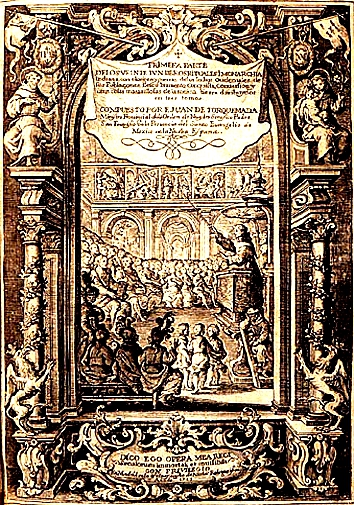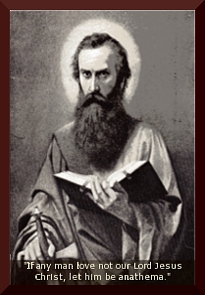From the Manual of The Holy Catholic Church, 1906
The Traditions of the Church
 Q. What is meant by tradition?
Q. What is meant by tradition?
A. The handing down from one generation to another, whether by word of mouth, or by writings, those truths revealed by Jesus Christ to his apostles, which either are not at all contained in the Holy Scripture, or at least are not clearly contained in them; of which we have seen above several instances.
Q. What is the principle upon which tradition proceeds?
A. It is the laying down, as an invariable rule, to be observed in every generation, firmly to adhere to the doctrine received from the preceding generation, and carefully to commit the same to the succeeding generation, without addition or diminution.
Q. Was this principle of tradition established by the apostles?
A. It was most firmly established by them, and they used the most efficacious means to preserve it.
Q What were these means?
A. We find these following laid down in their sacred writings: First, They warmly exhorted the faithful, and strictly commanded them to stick close to the doctrine which they had delivered to them, and to teach the same inviolate to those after them. Thus, “O Timothy,” says St. Paul, “keep that which is committed to thy trust, avoiding the profane novelties of words, and oppositions of knowledge, falsely so called, which some promising, have erred concerning the faith,” 1 Tim. vi. 20. “Hold the form of sound words, which thou hast heard of me, in faith, and in the love which is in Christ Jesus. Keep the good things committed to thy trust by the Holy Ghost, who dwelleth in us,” 2 Tim. i 13. “And the things which thou hast heard of me before many witnesses, the same commend to faithful men, who shall be fit to teach others also,” 2 Tim. ii. 2. “Continue thou in those things which thou hast learned, and which have been committed to thee, knowing of whom thou hast learned them,” 2 Tim. iii. 14.
Such are the injunctions which he laid upon the pastors of the church in the person of his disciple Timothy. And to show the bishops, or chief pastors, are particularly charged with the obligation of adhering to the doctrine delivered to them from the apostles, when relating to Titus the qualities of these chief pastors among others, he says, that a bishop ought to “embrace that faithful word which is according to doctrine, that he may be able to exhort in sound doctrine, and convince the gainsayers, – who must be reproved, who subvert whole houses, teaching things which they ought not for filthy lucre’s sake,” Tit. i. 9; where we see the strict charge laid upon the pastors, both to adhere to the true doctrine themselves, and to defend it against seducers.
The same injunction of adhering to the doctrine they had received, by tradition, from the apostles, he lays upon all the faithful in these words: “Therefore, brethren, stand fast, and hold the traditions which you have learned, whether by word, or by our epistle,” 2 Thess. ii. 15. St. Jude also writes his on purpose to enforce this duty on the faithful, and says, “I was under a necessity to write to you, to beseech you to contend earnestly for the faith once delivered to the saints, “ Jude, ver 3.
Such strong and repeated injunctions laid upon all, and especially upon the pastors of the church, who are appointed by Jesus Christ to be the guardians and teachers of the Faith, could not fail to make the deepest impression upon their minds, and have in all ages been considered as the great rule of their conduct in preserving the true doctrine inviolated.
Second, Not content with laying such strict commands upon the faithful to adhere firmly to the old doctrine handed down from the beginning, they also warn them against all broachers of new doctrine, describe their manners, foretell their reprobation and damnation, and command the faithful to avoid them. St. Paul writes to Timothy; “Now the Spirit manifestly saith, that, in the last times, some shall depart from the faith, fiving heed to spirits of error, and doctrines of devils, speaking lies in hypocrisy, and having their consciences seared;” 1 Tim. iv. 1
What an impression must this description make upon the minds of all serious Christians! what a horror must it raise in them against all innovations! “Know this also,” says the same apostle, “that in the last days, shall come on dangerous times, for men shall be lovers of themselves, covetous, haughty, proud, blasphemers, – lovers of pleasure more than of God; having an appearance indeed of godliness but denying the power thereof; now these avoid, for of this rot are they – who resist the truth, men corrupted in mind, reprobate concerning the faith,” 2 Tim. iii. 1. St. Peter also is very strong upon this head, when he says, “There shall be among you lying teachers, who shall bring in sects of perdition, (damnable heresies, as the Protestant translation has it) bringing upon themselves swift destruction – whose judgment now of a long time lingereth not, and their destruction slumbereth not, “ 2 Pet. ii. 1. St. Paul also to the Romans saith, “Now I beseech you, brethren, to mark them who cause dissensions and offences, contrary to the doctrine which you have learned, and to avoid them; for they that are such serve not Christ our Lord, but their own belly,” Rom. xvi. 17; and in his epistle to Titus, he says, “A man that is a heretic, after the first and second admonition, avoid; knowing that he that is such an one is subverted, and sinneth, being commanded by his own judgment,” Tit. ii.10.
Again, to Timothy he saith, “If any man teacheth otherwise, and consent not to the sound words of our Lord Jesus Christ, and to that doctrine which is according to godliness, he is proud, knowing nothing, but sick about questions and strifes of words – corrupted in mind, and destitute of the truth,” 1Tim. vi.3. St. John also speaks to the same purpose, saying “Whatsoever revolteth, and continueth not in the doctrine of Christ, hath not God – If any man come to you, and bring not this doctrine, receive him not into the house, and say not to him, God speed you; for he that saith to him, God speed you, communicate with his wicked works, “ 2 John 1:9-11. Could anything more efficacious have been said, than these oracles of the Holy Ghost, to excite in the hearts of the faithful the strongest aversion against even the smallest deviation from the doctrine they had received? Could anything more firmly establish the sacred principle of tradition? [our emphasis in bold]
Third, But to settle this principle upon the most solid footing, besides, what is above, these sacred writers pronounce a dreadful curse upon, and deliver over to Satan, all those who shall dare to alter or corrupt the faith once delivered to the saints, though but in one single article.
Thus when some false brethren, in St. Paul’s absence, had persuaded the Galatians, that it was necessary to join circumcision with the gospel, he wrote his epistle to them on purpose to correct this delusion; and though it was but an error in one point, and that in everything else they adhered to his doctrine; yet he calls it a “removing from the grace of Christ – and a perverting the gospel of Christ,” Gal. i. 6, 7. And then he adds, “but though we, or an angel from heaven, preach a gospel to you, besides that which we have preached to you, let him be accursed; as we said before, so I say now again, If any one preach to you a gospel beside that which you have received, let him be accursed.” Gal. i.8.
So also he mentions two heretics of his own time, who erred only in one point, and says, “Their speech spreadeth like a canker, of whom are Hymeneus and Philetus, who have erred from the truth, saying that the resurrection is past already, and have subverted the faith of some,” 2 Tim. ii. 17. But he had told his disciples before in what manner he had dealt with Hymeneus and Alexander, who “had made shipwreck of their faith; “ “ whom I have delivered to Satan, that they may learn not to blaspheme, “ 1 Tim. i. 20. Nothing surely could more effectually imprint in the minds of the faithful, the firmest attachment to the truths of the gospel, than this judgment of the apostle, or more excite their attention and solicitude, to preserve these sacred truths whole and undefiled, and to deliver them entire and uncorrupted to their posterity.



